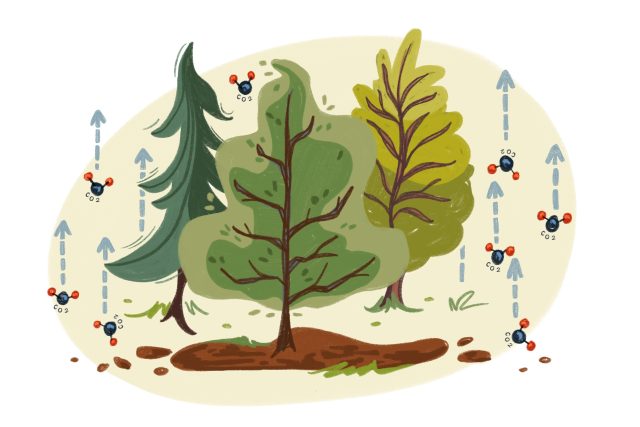[ad_1]
American forests are important sources of carbon sequestration, storing millions of tons of carbon dioxide each year. However, a unique experiment led by Peter Reich, University of Michigan professor in the School for Environmental and Sustainability, suggests carbon emissions from forest soil will likely increase as the climate continues to warm. Findings from the experiment, published on Aug. 20, measured soil and plant respiration in a northern Minnesota forest for 13 years. While the study was published this summer, the experiment is still ongoing.
North American forests in temperate climates are thought to be ideal for carbon sequestration because many of the tree species in these forests have a longer life span, and decomposition of organic materials like dead trees and leaves occurs at a slower rate in comparison to warmer climates. In an interview with The Michigan Daily, Reich spoke about how a warming climate will impact how well these temperate forests will be able to store carbon dioxide.
“There’s four times more carbon in the soil than the atmosphere, so if you could just even take a little bit more out of the atmosphere and put it in the soil, or hold on to what’s in the soil and get less back, that can help slow down climate change,” Reich said. “We’re worried that the evidence from the way the plants and microbes work is that they’re going to be challenged to do that as the climate changes.”
The Minnesota experiment consists of 72 plots across two sites that are surrounded by heat lamps to mimic the effects of global warming. To warm the soil, cables in the ground release heat. The plots contain 10,000 seedings of various tree species and native herbaceous plants like shrubs and ferns to mimic the behavior of various plants in the ecosystem.
Reich said it is rare that an experiment mimics climate change realistically by warming both the plants above the soil and the roots underground without the use of chambers to trap the heat. He also said the field design requires frequent maintenance and costs can often become a limitation for research.
“In a warmer world, plants might acquire more or less carbon from the atmosphere because of the fact that they’re warmed,” Reich said. “So if you do an experiment where you’re not warming the plants above ground, you’re missing a big part of the way in which climate change will influence this whole process.”
Guopeng Liang, a postdoctoral associate at Yale University, co-authored the article on the experiment’s findings. Liang said there are only two comparable studies that attempt to measure the effects of climate change on forest soil. However, Liang said it is important to better understand how climate change will affect not only temperate forests but also those across climates.
“Across the world, we only have like three field experiments,” Liang said. “So one is ours, another one is Harvard Forest and the other one is in Europe. … So we need more long-term experiments across all of the world, not only in just the North America or just in Europe.”
Artur Stefanski, an assistant professor of forestry at the University of Wisconsin, has acted as lead project manager since the experiment began. Stefanski said while scientists generally understand that climate change will reduce carbon sequestration, there is still a lot to learn about the mechanisms of this process.
“In this particular case, we learned that forests from these regions are likely going to lose more carbon, but all that will depend on how moist or dry the future climate will be,” Stefanski said.
While scientists have understood that climate change will make forest soils generally drier due to increasing temperatures and less consistent rainfall, it was not known exactly how this would impact soil respiration, according to Reich. Reich also discussed how increasing temperatures are generally thought to accelerate the decomposition of organic matter like decaying plants.
Reich said recent findings from the experiment suggest if these soils happen to be drier, the activity of soil microbes — organisms that are critical for decomposition — slows down.
“Climate change is accelerating this loss of carbon back to the atmosphere, which will speed up climate change, Reich said. ”But through this indirect pathway where warming is also drying, that’s actually dampening that loss a little bit. That was probably the main take-home message from the paper is this combination of effects: your direct effects of warming, and then these indirect effects through soil drying.”
Daily Staff Reporter Amanda Venclovaite Pirani can be reached at amandavp@umich.edu.
Related articles
[ad_2]
Source link











